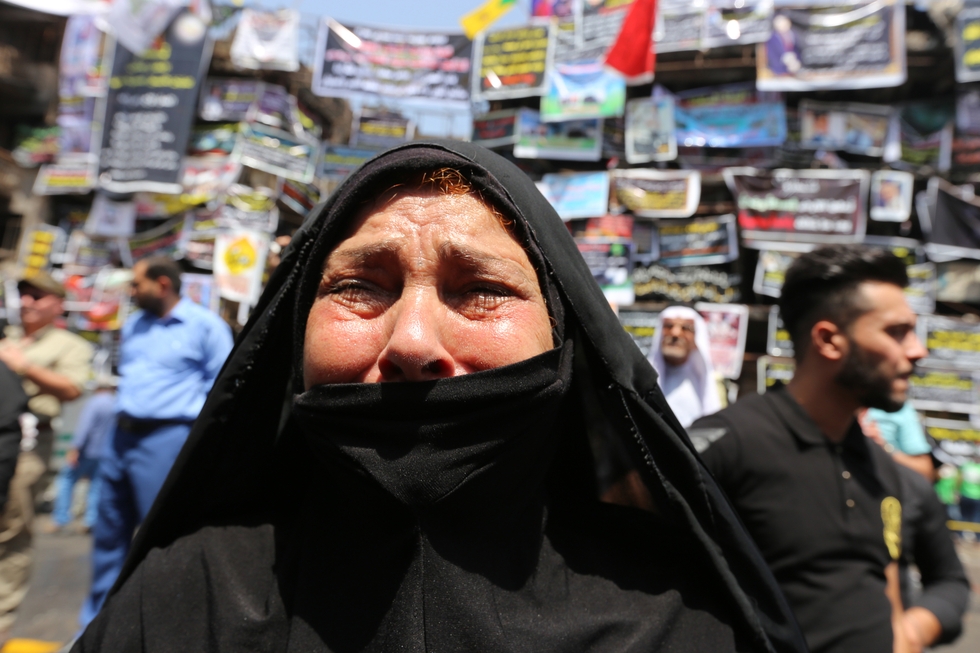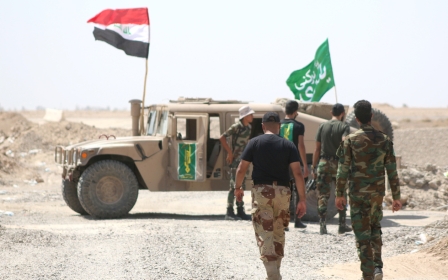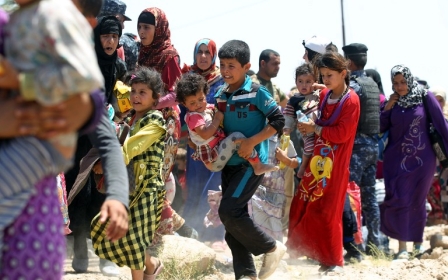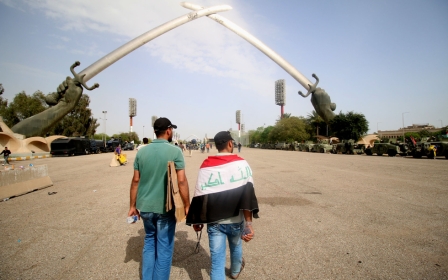Iraqis mourn Karrada amid anger at political establishment

At a time when Muslims worldwide celebrate the end of the holy Ramadan month, the Iraqi nation is in mourning over the 250 innocent lives extinguished in the latest Islamic State (IS) terror bombing.
Undetected by state forces, terrorists ploughed a refrigerated truck carrying explosives into the densely populated well-to-do district of al-Karrada in central Baghdad. “People came to buy clothes to celebrate Eid. Now they are buying coffins,” one survivor lamented.
This is the latest attack in a long series that IS has launched against civilians – both Shia and Sunni – in Bangladesh, Turkey, and most recently Saudi Arabia. Their violence respects no faith.
The series of fires the explosion ignited converged into a firestorm, ravaging two shopping arcades in the commercial centre. Bodies recovered from beneath the rubble were burned beyond recognition – sons unidentifiable to their mothers. Hadi mall, consumed head-to-toe by the inferno, was not designed with fire escape routes in mind, as Iraqi analyst Sajad Jiyad wrote in his blog-post. “There were no emergency exits, the door to the roof was welded shut” to keep thieves out. While the same risks easily apply to other buildings dotted around Baghdad, no official statements on the subject of fire safety have been issued.
Melting pot
Long before the ethnic segmentation of Baghdad’s urban fabric, the affluent Shia-majority neighbourhood was once a symbol of community diversity. Speaking to a woman who left Iraq 22 years ago, I relived memories of Karrada she had kept alive in spite of the distance between her and Iraq. “It exudes a vibrancy that attracted Iraqis from all over the country,” Saba said. The district had also been home to several Christian families, none of whom remained inside Iraq following the rise of sectarian militias and thugs in 2004. The urban violence that continues to characterise Karrada to a western audience may forever extinguish memories of Iraq’s bygone age of diversity.
Anger, disgust and betrayal together typify the current mood inside the capital. Indignant masses feel cheated by their government whose military victories are yet to translate into political wins. The corruption on which the political system is predicated have yielded little more than paralysis and scandal.
All the while, the political class demonstrates neither the will nor ability to act in the interests of its people. Despite having led Iraq into the abyss, America responded to the Karrada blast by reaffirming its commitment to fight IS terrorism. The promises they and Iraqi Prime Minister Haider al-Abadi have sounded have noticeably increased with time, but insecurity and turbulence continue to paralyse the ability of the Abadi government to eradicate IS and reign in its brutish militias.
Security failures
But how did local security forces not prevent the truck from entering a restricted area? Why has the government not replaced fake metal detectors with functioning equipment? Why has the government not clamped down on secret IS sleeper cells? The government's failure to provide answers to these questions generated a ferocious blowback against the Iraqi premier during his visit to Karrada – where he himself is from.
A far from warm welcome awaited Abadi as he cruised into Karrada with his entourage to offer condolences to aggrieved citizens. Locals flooded the scene hurling jerrycans, shoes and bricks at his convoy, screaming "thief thief", "liar liar". One Baghdadi resident confided to me that “it is possible that the attack could have been prevented”. The fact that it was not has confirmed the widely held and damning opinion that "a negligent government is a culpable one".
As IS leaches off a weak political system, little is being done to prevent the militant group from expanding its bases elsewhere. Until the government devotes all its energies towards the strengthening of security procedures, the threat of sudden death will not disappear any time soon.
Sahar, who left Baghdad on the night of the blast, described Sunday evening as a generally peaceful night. “The temperature was around 47 degrees Celsius and it was Ramadan. After people break their fast they go out to restaurants, shrines and parks. Malls were vibrant and busy with shoppers, and the sectarian divisions we hear about were not visible.”
The following Monday after the cowardly blast, 20 to 50 rockets were allegedly fired in the direction of former US base Camp Liberty, which now houses Iranian dissidents, near Baghdad airport. The incident offers a microscopic glimpse into the various dangers and risks Iraq faces if power remains fragmented.
Entire families that cannot be brought back to life were wiped out in Sunday’s inferno, yet all the government can offer is a trifling apology, and promises to execute thousands of prisoners it has yet to try for terror offences. Minister of Interior Mohammed Ghabban has tendered his resignation , but the prime minister has yet to accept it. No speech accompanied the resignation which not everyone believes Ghabban will follow through with.
Empty rhetoric
Iraq’s people are uninterested in political spectacles, grand gestures and rhetorical devices. They want to see the changes Abadi has long been promising to implement. His government, in all its failures, and the no-less guilty figureheads America installed before him, form part of the legacy of US President George W Bush and his imperial occupation. Bush's partner in crime, former British prime minister Tony Blair, stood before global audiences yesterday staunchly defending the decision to place Britain on the warpath after the long-awaited Chilcot Report was published.
No apologies will restore the dead to life, or provide homes to the four million internally displaced Iraqis. In the words of the London-based Iraqi Collective (ITC), “wounds are still healing for the millions of Iraqis, and the British that have been affected by the decision to go to war and the negligent post-invasion actions of the warmongers”.
Karrada is part of a never-ending crisis. The pain it has unleashed is it not uncommon, neither are the images it has left us with. Clusters of bodies were found huddled – even in their moment of death – fathers clutching daughters, brothers clutching sisters. These are the scenes that will strengthen the resolve of Iraqis to unite against politicians uninterested in the risks that their actions continue to expose Iraqis to.
-Nazli Tarzi is an independent journalist, whose writings and films focus on Iraq's ancient history and contemporary political scene. You can follow her on Twitter @NazliTarzi
The views expressed in this article belong to the author and do not necessarily reflect the editorial policy of Middle East Eye.
Photo: An Iraqi woman cries on 7 July, 2016 in front of a memorial for the victims of a bombing which claimed the lives of over 200 people in Baghdad's Karrada neighbourhood (AFP).
This article is available in French on Middle East Eye French edition.
New MEE newsletter: Jerusalem Dispatch
Sign up to get the latest insights and analysis on Israel-Palestine, alongside Turkey Unpacked and other MEE newsletters
Middle East Eye delivers independent and unrivalled coverage and analysis of the Middle East, North Africa and beyond. To learn more about republishing this content and the associated fees, please fill out this form. More about MEE can be found here.





